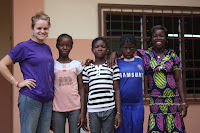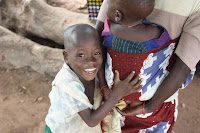
In Romania, 1995, three Peace Corps volunteers and four Romanian teachers took 80 young women to a mountain campsite for a weeklong leadership camp. The intentions for this camp were to encourage the young women to become active, contributing citizens by boosting their self-esteem and confidence, augmenting their self-awareness and expanding their life-skills overall. The camp was created because of the observed needs and trends within Romanian culture such as the ongoing divide in traditional gender roles, the acceptance among youth of this division, the fact that there were very few female role models in any position of power and a lack of leadership skills among students as a whole. This weeklong camp met these goals and Camp GLOW (Girls Leading Our World) was born.
Since that first camp in Romania, the project has been adapted in various other Peace Corps countries, Benin being among them. In addi
tion to girls’ camps, there are also boys camps as change needs to happen on both ends. Female empowerment in Benin

is critical to its’ development. Women rarely work outside the home in a professional capacity, but are often responsible for procuring funds for their children’s education and medical care because men often squander what little money they do make on alcohol or motorcycle parts, or simply refuse to contribute, or have no income themselves. While these circumstances certainly are unfortunate, they do contribute to the reasons studies have found women to make better political leaders, especially in the developing world (Wudunn and Kristof. Half the Sky). According to this study, women are less likely to become corrupt and more likely to prioritize education and healthcare and cut back on frivolous spending. For these reasons and the hope for change, I have chosen to be an active participant in Camp GLOW.
Over the course of the past month and a half, I helped organize and operate two Camp GLOWs. One was a day camp in the city of Bohicon (pronounced boy-con) and the other, a different animal entirely, was an overnight camp in Parakou (pair-a-koo), which I will be co-directing next year.
Bohicon is a fairly large city in Benin 150,000 with two Peace Corps volunteers, a married couple (Craig & Heather), posted there. Craig & Heather organized the camp and invited 50 of the top girls from surrounding schools. The girls were from what would be middle school in the U.S. The Parakou camp structure is quite different: 50 girls are invited in total, with each participating Peace Corps Volunteer getting two to four places to fill. Girls typically range in age from 12-17. How each volunteer chooses their girls is up to them, but they are usually the top ranking girls in their schools. Girls then travel with their volunteer to Parakou and spend the week at camp.
On August 7, three girls and I piled into a navy blue, bare-minimum Peugeot driven by a man named Ali, and drove, or tumbled I believe more aptly describes the voyage, towards Parakou. I felt as though I was inside a mad scientist’s laboratory the way the car beeped and whistled at random in addition to somewhat violent jostling as a result of terrible dirt roads and what felt like the absence of shocks. Fifteen minutes before we got to Parakou, we had to pull over so one girl could relieve her car sickness. However, none of the passenger doors in Ali’s car open from the inside, so, with a bang here, a lift there and a pull at the very sensitive angle of 17 degrees above the horizontal. She made it. Phew.
At both camps, we (volunteers) taught various sessions that the girls wouldn’t find in their traditional Beninese education system. These sessions included reproductive and female health, good hygiene practices, nutrition, legal rights of a girl/woman against rape and sexual assault and places they can go for help. We also led sessions to encourage the girls to work to realize their dreams; this included actually telling them it can happen, teaching goal planning,
decision-making and recognizing self and individuality. This last bit often proves the most challenging. Creativity and individualism are discouraged at an early age by social pressures of the culture and students are taught to conform and that there is a right and a wrong way to think – the right way being a very literal, limited manner.
Cultural pressures largely contribute to this as cited in an ethnology entitled “African Friends and Money Matter” by David Maranz:
Not only does family loyalty gum up African governments, it can hobble the careers and limit the achievements of individual Africans…A continent-wide survey of family studies has found that kinship squabbles thwart the individual’s initiative and creativity and interfere with his efficiency. (Harden, B. 1990. Africa: Dispatched from a fragile continent. New York, NY; W.W. Norton.
All of this lends itself to the challenge of development in third-world Africa.
We also played sports with the girls, which was like watching people play handball with hooves. Girls are not used to playing sports here because while their brothers go play soccer, girls are bound by household chores and the rearing of younger siblings. The girls had fun, though and were more concerned with having a good time and winning than silly rules like having to dribble in basketball. A competitive game of red-light green-light left me trying to catch cheaters as I was being charged by 50 teenage girls. And they hated being caught. Hilarious and mildly chaotic, sports were a highlight of this Camp GLOW.
At each camp, we also had an ongoing question box or “boîte des questions” so that girls could ask any questions that came up throughout the week and various sessions. Each day we would read the questions out loud and respond to them in an open-dialogue form. Some questions were comical – i.e. “Are Rich and Patrick married? If yes, do they have kids already?” (Rich and Patrick are two very cute Peace Corps volunteers who many girls developed crushes on). And some were more upsetting: “Is it ok for my brother to have sex with me?” The anonymity of the question box allowed girls to get answers to questions they might otherwise be too shy to ask. And it is questions like the latter that remind me that what we’re doing is important.
The overnight camp in Parakou was hosted at the University of Parakou and gave the girls the opportunity to have a computer session. For many of the girls, it was the first time they had ever been in the city, the dormitories were the first two-story building they’d ever seen and we had to have a little lesson on how to use a toilet, primarily the flushing part. Thus, you can imagine their bewilderment when face to face with a 17-inch Hewlett-Packard monitor. It was a fun session as we watched them scan and poke at the keyboard as they typed their names in Word. It sounded like a flock of chickens came in and began searching for grain in the keyboards. Or, like my dad was in the room working on a word document. It made me think of how fortunate we are as Americans: at 9 years old, I had computer lab with keyboard tests (which we all cheated on by slouching in our plastic chairs) and the Oregon Trail. At their age, when they are trying to find the space bar, I was typing 10-page reports likely researched in part on the Internet. The differences are hard to wrap your head around sometimes.

One of the best parts of playing a role in these two Camp GLOWs was watching the girls grow and evolve, even over the short period of time we were together. The girl who started out shy and soft-spoken became an active participant in sessions and spoke with confidence. All of them had a Rosie-the-Riveter “We Can Do It” sass by the time we left. All of this gave me confidence that these girls were going to go out and do something; that despite all the challenges that being a Beninese girl brings, they will overcome.





















